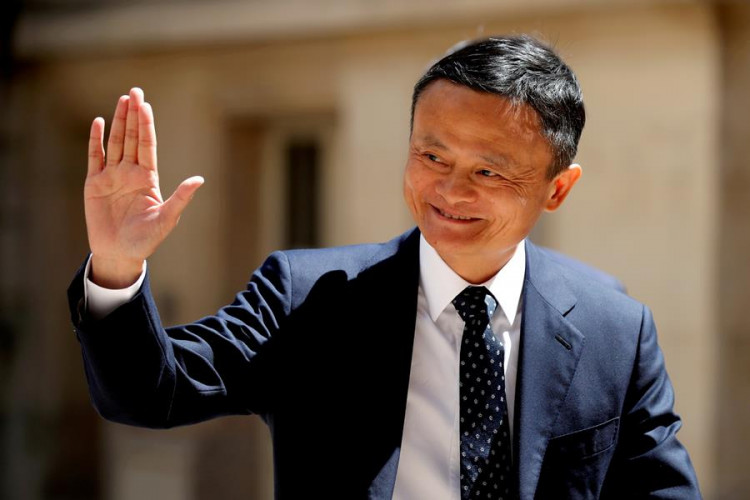Having revolutionized the way the Chinese shop and live by creating Alibaba, Jack Ma has earned his stripes as a significant entrepreneur and business leader. Since his official retirement in 2019, he's kept a relatively low profile.
In the last four years, Ma's frequent trips to Europe for studies and stints as a university professor might seem ordinary. But his actions hint at deeper contemplations. Following his return to China in March this year, Alibaba underwent a significant reorganization, dubbed "one into six," its most significant restructuring ever. Shortly after, reports surfaced of Ma's venture into renewable energy.
On July 20, a company named "1.8 Meters Ocean Technology" was founded. Public records reveal the majority stakeholder, with 80% shares, to be "1.8 Meters." Another stakeholder owning 10% is "Hangzhou Big Well Twenty-Two Cultural Arts Ltd," of which Ma holds a 99.9% stake. This development brought Ma's latest ventures into the spotlight.
By July 28, "1.8 Meters Ocean Technology" had invested in its Zhoushan counterpart. The major shareholder, "1.8 Meters," also established two other firms in May and July - "1.8 Agriculture Technology (Hainan) Ltd" and "1.8 Ocean Technology (Zhejiang) Ltd."
As more companies with "1.8 Meters" in their names were established, Ma's new investment landscape became clearer.
In essence, the operational scope of "1.8 Meters Ocean Technology" falls into two categories: marine industries, including aquaculture, food sales, and seafood processing, and renewable energy, encompassing offshore wind power, solar power generation, energy storage, and equipment manufacturing.
Of these, new energy sectors centered on technology and research seem to be Ma's primary focus. Though he hasn't shared specific goals, this direction speaks volumes about his ambitions.
China has rich offshore wind resources, and its growth trajectory looks promising. Governmental policies, technological advancements, and market dynamics are all signaling positive prospects. For instance, the government is advocating for accelerated development of clustered offshore wind power.
According to the China Electricity Council, in 2022, the total installed capacity for power generation grew by 8.0% year-on-year. Grid-connected wind power saw a rise of 11.2%, while solar energy grew by a whopping 28.1%. These sectors, witnessing the strongest growth, are precisely where Ma is setting his sights.
The energy storage market, where magnates like Elon Musk and Contemporary Amperex Technology Ltd. (CATL) are heavily investing, is also on Ma's radar. Musk unveiled a bold plan in March, aiming to produce commercial energy storage batteries in Shanghai. Meanwhile, CATL's R&D investment has soared in recent years, leading the global market in energy storage battery shipments.
Currently, the energy storage market is in its early stages of commercialization. However, based on the Fourteenth Five-Year Plan, large-scale commercial use of new energy storage is projected to commence in 2025, with China positioned as a global leader by 2030.
The transition to a low-carbon era signifies a steadily growing global market for renewable energy. As the renewable energy sector transforms into a high-tech industry, vast opportunities lurk behind rapid technological advancements.
However, this bright outlook implies fierce global competition. Europe has an early start in wind power and energy storage. The U.S. boasts strong policy support, and though China is catching up swiftly, the window of opportunity for newcomers might be brief.
Ma's post-retirement decision to venture into offshore wind power and energy storage sectors was, undoubtedly, well-considered. A former Alibaba employee suggested that Ma is likely to explore markets with vast potential that represent the future, with renewable energy being one of them.
While Alibaba insiders have clarified that "1.8 Meters Ocean Technology" is unrelated to Alibaba Group, many of Ma's partners in this new venture have Alibaba connections. For instance, individual shareholders of "1.8 Meters Ocean Technology" include Hu Xiaoming, Deng Zhonghua, Lin Zhifeng, and Chen Zesong - all of whom have had significant roles at Alibaba.
Furthermore, Ma's investment direction aligns with Alibaba's business trajectory. From Alibaba Cloud to its other ventures, there's a consistent focus on new energy and new technology. Recently, Alibaba Cloud has partnered with the South China Grid, delving into electricity dispatch services and successfully developing AI algorithms predicting wind speed and power output for wind farms.
Many business magnates post-retirement or during their tenure often invest privately in ventures that complement their original companies.
In recent years, as tech industry founders either retire or step back from the frontlines, they either chase other dreams or explore new possibilities for their companies. Founders like Huang Zheng, Zhang Yiming, Liu Qiangdong, and Su Hua have made similar choices.
With the global surge in renewable energy, Ma is entering a highly competitive high-tech sector. In the realm of e-commerce, he was a pioneer, but in the renewable energy sector, he's playing catch-up.
Nevertheless, as Ma ventures into wind power, not only does he bring more attention to the renewable energy sector but also ushers in fresh perspectives.
Years ago, during a notable conversation with Musk, Ma faced criticism for underestimating technology, once remarking, "I'm not a high-tech person; I talk about life."
Now, Ma is delving into technology and has joined the renewable energy sector, a field Musk passionately advocates.
In any era, Jack Ma remains a force to be reckoned with.




